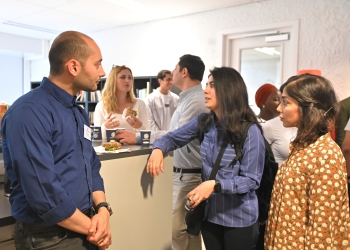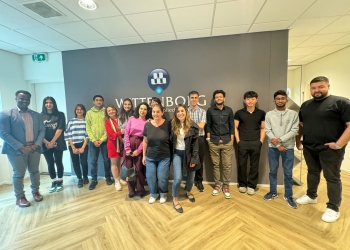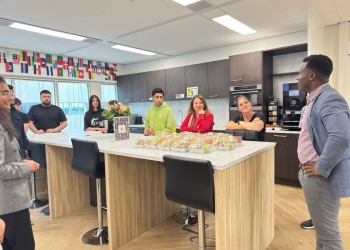The Start of an Adventure: 54 New Students Join Wittenborg for May Block
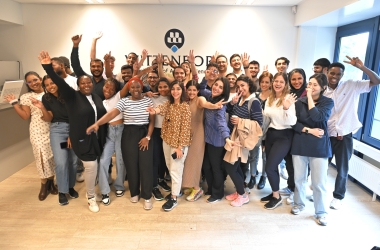
Introduction Week Provides Students with Valuable Information on School and Life Abroad
Optimism, excitement and enthusiasm filled Wittenborg’s study locations in Apeldoorn, Amsterdam and Munich as 54 new international students attended the school’s traditional Introduction Week from 14 to 17 May.
This was an opportunity to learn more about the school’s infrastructure, services and organisation, as well as life in the Netherlands and Germany. Moreover, the new members of the Wittenborg family had the chance to make friends and get ready for this special journey. At all of Wittenborg’s locations, the activities were concluded with an Introductory Lunch that also involved the school’s staff members and lecturers.
Wittenborg has six intakes per year. Following the February, April and May intakes, the next will be in August, October and December.
During the Introductory Lunch held in Apeldoorn, the school’s Director of Governance Karen Penninga encouraged the new students to help and learn from each other. “You should help each other because you will all run into the same issues. And don’t forget that we also have a lot of international staff members here and many are former students who decided to live and work in the Netherlands. They are very willing to help you thrive in the Netherlands, be successful in your studies and enjoy your time here. So, good luck and count on us to help you because we are very cooperative.”
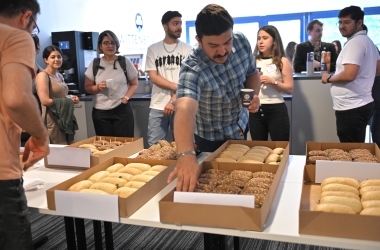
Iranian student Azita Armin, pursuing an MBA degree in International Management, commented that she chose Wittenborg because, among other reasons, she heard good things about the institution from friends who were already students there. Armin, who moved to the Netherlands in early May, said that she really likes the country and would like to stay and find work after graduating. “I already knew some Iranian people who study at Wittenborg, but during the Introduction Week I’ve made new friends from different countries such as South Korea and India. On top of that, the teachers and tutors have been very nice and helpful, and I’ve received plenty of good advice.”
For Research & Education Coordinator Selina Hinten-White, attending Wittenborg’s Introductory Lunch is always a welcoming and enjoyable experience. “It is great to meet students arriving from all over the world with diverse cultures and perspectives. By fostering a sense of community and belonging from the start, Wittenborg sets the stage for a fulfilling academic journey that students will hopefully cherish long after their graduation.”
Hinten-White advised students to embrace the cultural diversity both within Wittenborg and in the broader Dutch society. “I would also emphasise the importance of time management and effective study habits, especially in a new academic environment. Setting realistic goals, staying organised and seeking help when needed can greatly contribute to a student’s academic success.”
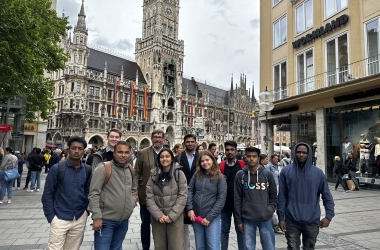
A special visitor in Munich
In addition to the regular activities of the Introduction Week, Wittenborg’s Munich study location welcomed its new students with a special talk by Michaela Hein from TK (Die Techniker Krankenkasse), a statutory health insurance fund in Germany. Hein discussed the importance of having good health insurance in Germany as well as the options available for students. She detailed the fees and standard contributions, what is and is not covered by the insurance, and the fact that the company also offers English-speaking customer service within the country.
Bachelor’s student Silvana Bernal Paz, originally from Mexico, expressed how she felt about joining the school. “I studied at a German school back home in Mexico, and I am comfortable speaking three languages. To maintain my proficiency in all of them, I decided to move to Germany, where I could practise German in my daily life while studying in English. I chose Wittenborg over other schools because I love the structure of their bachelor’s programme as well as their personalised approach to everything, from the admissions process to the small classroom settings that facilitate discussion, learning and interaction with the lecturers.”
WUP 23/05/2024
by Ulisses Sawczuk
©WUAS Press
